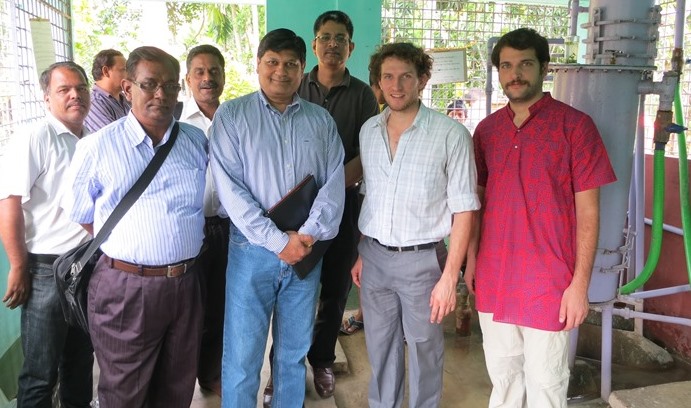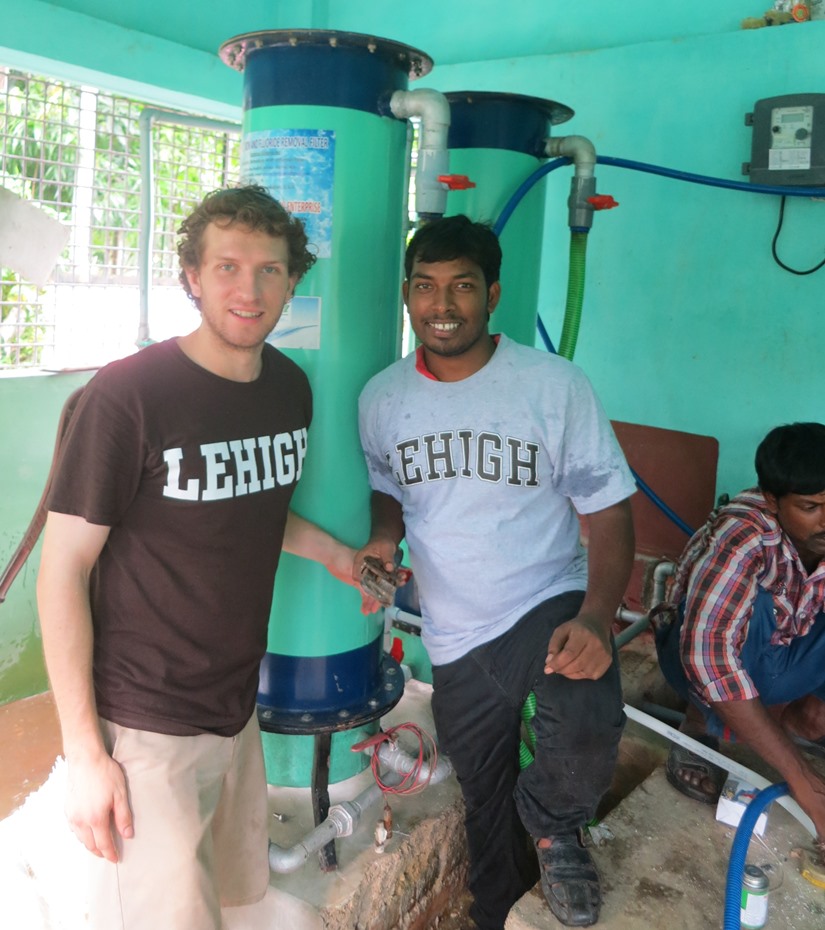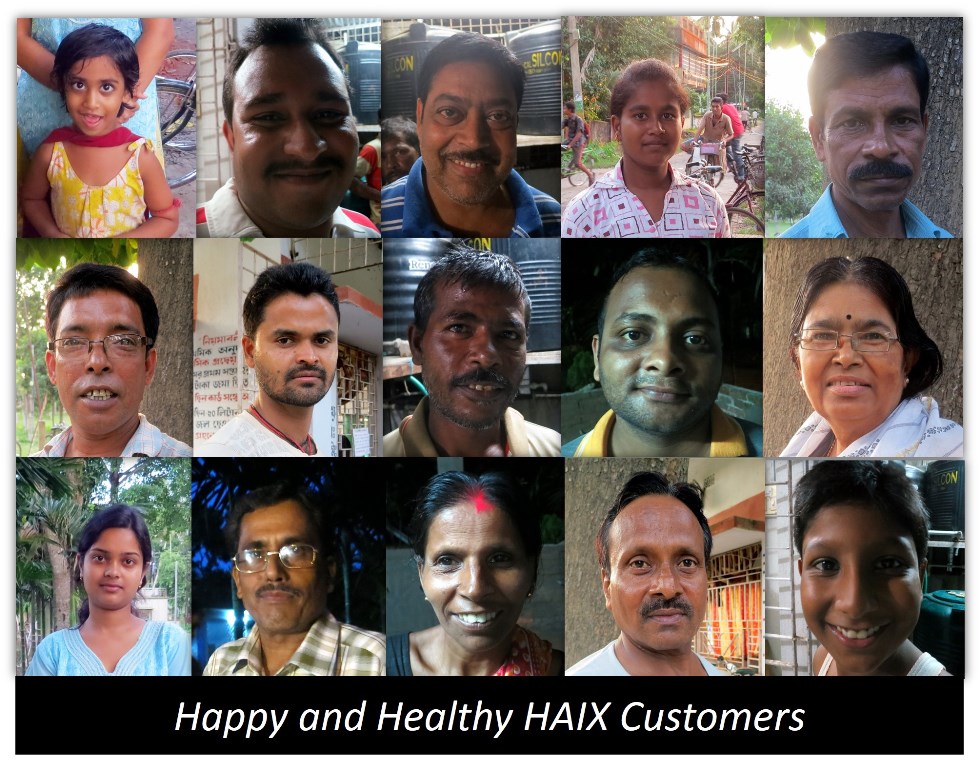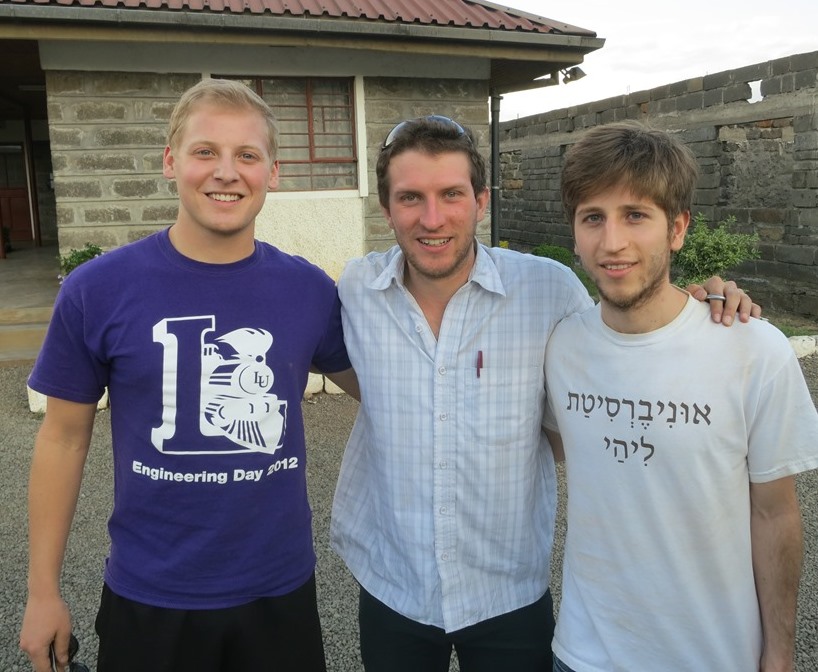Grad student’s water startup wins U.S.-India grant

Ph.D. student Mike German (second from right) visits a village in the Indian state of West Bengal where a filter designed by German and Prof. Arup SenGupta has been installed. Nilesh Shah (front, center) of the U.S. Embassy in India has lobbied for the development of safe water projects in India. Prasun SenGupta (second from left) is president of Technology with a Human Face, a nongovernmental agency German helped establish in India.
Four years ago, Mike German rode his bicycle from coast to coast, from California to Virginia, to raise money to help provide clean drinking water in the African nation of Zambia.
German had just completed his B.S. in chemical engineering at the University of Maryland, Baltimore County. He was preparing to enroll in graduate school and devote his career to alternative energy and climate change.
During his 55-day, 4,000-mile bike trek, however, he had a change of heart.
“I realized that water is much more personal,” he says.
After completing his trip, German enrolled at Lehigh and began studying with Arup K. SenGupta, the P.C. Rossin Professor of Civil and Environmental Engineering, who has spent three decades cleaning contaminated drinking water around the world.
A year and a half ago, German and SenGupta co-founded WIST (Water Innovation through Science and Technology) with Minhaj Chowdhury, CEO of Drinkwell, in an effort to solve water crises in Asia and Africa.
WIST and its partner, RiteWater, a small technology-based company in India, recently received $400,000 from the United States-India Science and Technology Endowment Fund for a proposal titled “Transforming Arsenic and Fluoride Crisis in Drinking Water into an Economic Enterprise.” USISTEF was created by the U.S. and Indian governments to promote innovation and “technopreneurship.”
Two deadly and naturally occurring elements
German, who completed a M.S. in environmental engineering from Lehigh in the fall of 2013, spent a year in India as a Fulbright-Nehru Scholar before beginning his Ph.D. studies. SenGupta and Chowdhury are also former Fulbright Scholars on the Indian subcontinent.
Fluoride and arsenic, which occur naturally in ground water, can have devastating health effects—especially in children—when ingested in excessive amounts. According to the World Health Organization, high levels of fluoride in water destroy teeth and cause crippling skeletal damage. Arsenic, found throughout the earth’s crust, causes skin ulcers and can also lead to cancer of the skin, lungs, bladder and kidney.
The USISTEF grant will enable German and SenGupta to take water-remediation technologies they’ve developed at Lehigh, implement them in communities that lack access to safe drinking water, and make them economically sustainable while generating profits and creating jobs. The technologies use sorbents to remove arsenic and fluoride from well water.
“The grant is about bringing new technologies developed at Lehigh to India, scaling them up and commercializing them in India and the United States,” says German.
SenGupta, who is German’s Ph.D. dissertation supervisor, tips his hat to German.
“We have been involved in arsenic mitigation in south and southeast Asia for 15 years,” he says. “But it is Mike’s tenacious pursuit of the cause in multiple field projects, his ability to integrate other stakeholders, and his belief that science and technology can improve the quality of life for marginalized people, that have played a significant role in receiving this highly competitive grant from two major countries.”
Sustainable funding strategies
German says WIST uses a “micro-franchise business model” to transform water-remediation systems into self-sustaining commercial enterprises.
“There have been a lot of iterations on how to do community systems,” he says. “The shift now is from NGO (nongovernmental organization) operation models to for-profit models. But there are still a lot of questions, from funding strategies to how to package materials, about how to make a for-profit business work. For it to work, it has to be self-sustaining.
“A lot of NGOs have failed because they didn’t think that through. They were not local and there was not so much buy-in. Because some people are used to government systems, when things break down, they expect the government to pay for it. Some of this will be a mixture of molding appropriate behaviors,” he says.
German says the concept of the “technopreneur” is becoming more popular.
“Starting my graduation year, with the hopelessness of finding jobs, there came this idea that you need to create your own opportunities. With that, came a big push toward entrepreneurship, with technology.”
German is spending the month of December in Kenya testing water-remediation technologies that he and SenGupta developed. He will return to India in January.
German says the difference between working for several months in another country and staying for just a few weeks is like the difference between biking across a country and driving.
“Bicycling gives you a true sense for the scale of places. It might take you an hour to go 10-20 miles, laboring the entire time with nothing between your eyes and the environment around you. Driving a car is effortless but mindless. You go 60-70 miles in an hour with your body totally detached from the real world.”
The same concept applies to his travels in India and Kenya, says German.
“There is a cliché that you can’t understand a man’s story until you walk 10 miles in his shoes. I’ve found that to be very true. Whether it’s a different culture, place or setting, you have to experience something to truly understand it.
“The time you spend in a place, and the strong relationships you develop, are indispensable to success.”
Posted on:




